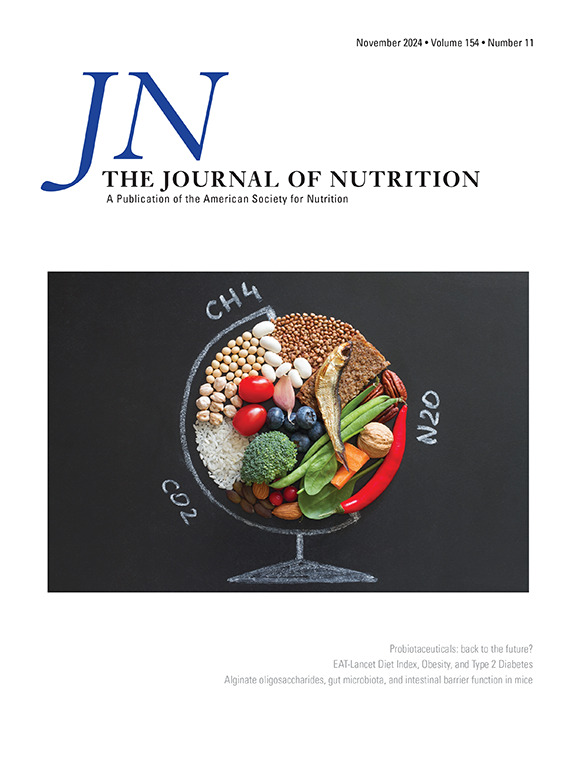Regular Consumption of Black Tea Kombucha Modulates the Gut Microbiota in Individuals with and without Obesity
IF 3.7
3区 医学
Q2 NUTRITION & DIETETICS
引用次数: 0
Abstract
Background
Kombucha, a fermented beverage obtained from a Symbiotic Culture of Bacteria and Yeast, has shown potential in modulating gut microbiota, although no clinical trials have been done.
Objectives
We aimed to evaluate the effects of regular black tea kombucha consumption on intestinal health in individuals with and without obesity.
Methods
A pre-post clinical intervention study was conducted lasting 8 wk. Forty-six participants were allocated into 2 groups: normal weight + black tea kombucha (n = 23); and obese + black tea kombucha (n = 23). Blood, urine, and stool samples were collected at baseline (T0) and after 8 wk of intervention (T8).
Results
A total of 145 phenolic compounds were identified in the kombucha, primarily flavonoids (81%) and phenolic acids (19%). Kombucha favored commensal bacteria such as Bacteroidota and Akkermanciaceae, especially in the obese group. Subdoligranulum, a butyrate producer, also increased in the obese group after kombucha consumption (P = 0.031). Obesity-associated genera Ruminococcus and Dorea were elevated in the obese group at baseline (P < 0.05) and reduced after kombucha consumption, becoming similar to the normal weight group (Ruminococcus: obese T8 × normal weight T8: P = 0.27; Dorea: obese T8 × normal weight T0: P = 0.57; obese T8 × normal weight T8: P = 0.32). Fungal diversity increased, with a greater abundance of Saccharomyces in both groups and reductions in Exophiala and Rhodotorula, particularly in the obese group. Pichia and Dekkera, key microorganisms in kombucha, were identified as biomarkers after the intervention.
Conclusions
Regular kombucha consumption positively influenced gut microbiota in both normal and obese groups, with more pronounced effects in the obese group, suggesting that it may be especially beneficial for those individuals.
This trial was registered at Brazilian Clinical Trial Registry – ReBEC as UTN code U1111-1263-9550 (https://ensaiosclinicos.gov.br/rg/RBR-9832wsx).
经常饮用红茶康普茶可以调节肥胖和非肥胖个体的肠道微生物群。
背景:康普茶是一种从细菌和酵母共生培养(SCOBY)中获得的发酵饮料,尽管尚未进行临床试验,但已显示出调节肠道微生物群的潜力。目的:我们旨在评估定期饮用康普茶对肥胖和非肥胖个体肠道健康的影响。方法:进行为期8周的临床前后干预研究。46名参与者被分为两组:正常体重+红茶康普茶(n=23);肥胖+红茶康普茶(n=23)。在基线(T0)和干预8周(T8)后采集血液、尿液和粪便样本。结果:共鉴定出145种酚类化合物,主要为黄酮类化合物(81%)和酚酸类化合物(19%)。康普茶有利于共生细菌,如拟杆菌科和阿克曼科,特别是在肥胖组。肥胖组食用康普茶后,丁酸盐生成物多冈下骨也增加(p=0.031)。肥胖组与肥胖相关的Ruminococcus和Dorea属在基线时升高(结论:定期饮用康普茶对正常组和肥胖组的肠道微生物群都有积极影响,肥胖组的效果更明显,表明康普茶可能对这些个体特别有益。注册id和url:本研究已在巴西临床试验注册中心- ReBEC注册(UTN代码U1111-1263-9550);临床试验声明:本研究按照《赫尔辛基宣言》中确立的指导方针进行,程序经巴西国家研究伦理委员会(CONEP/Brazil)批准。3.948.033)。所有受试者均获得书面知情同意。该研究已在巴西临床试验注册中心(ReBEC)注册,可在(UTN代码U1111-1263-9550)获得。
本文章由计算机程序翻译,如有差异,请以英文原文为准。
求助全文
约1分钟内获得全文
求助全文
来源期刊

Journal of Nutrition
医学-营养学
CiteScore
7.60
自引率
4.80%
发文量
260
审稿时长
39 days
期刊介绍:
The Journal of Nutrition (JN/J Nutr) publishes peer-reviewed original research papers covering all aspects of experimental nutrition in humans and other animal species; special articles such as reviews and biographies of prominent nutrition scientists; and issues, opinions, and commentaries on controversial issues in nutrition. Supplements are frequently published to provide extended discussion of topics of special interest.
 求助内容:
求助内容: 应助结果提醒方式:
应助结果提醒方式:


